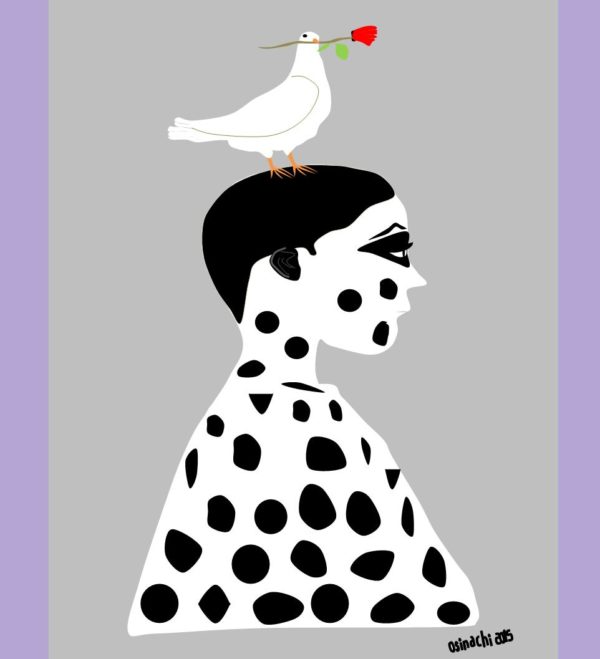
Acan Innocent Immaculate’s “Songbird” is taken from Go the Way Your Blood Beats, an anthology edited by Anathi Jongilanga and forthcoming on Brittle Paper.
1.
HOME
IN THE OLD days, you knew when you gave birth to a musambwa. Before it released its first bewitching cry, before the liquor was cold on its skin, your mothers wrenched it from your child’s body and buried it in a clay pot deep in the ground, where its entrapping song would never be heard. You bathed your child in pungent, blessed herbs so the Demon could never find its way back to the home it had chosen. You made offerings to your family’s god, gave appeasements to the earth and the forest. You named your child after a strong holy ancestor of the clan. That way, you saved your family. That way, you saved your clan. You saved everybody.
But times have changed. The wisdom of old has been swept aside, usurped by the shinier knowledge of the Western world. This is why Salima doesn’t know when she gives birth to a musambwa. It has been an easy pregnancy for her, easier than the first one who decided he didn’t want to stay, easier than the second and third who almost killed her on their way into the world. The labor pains come like an old friend instead of a vengeful foe, gentle strokes in her lower back urging her to release, to let go. In the hospital, she pushes once, twice, and the child slips out onto the polythene covering of the maternity bed, squirming and screaming.
“A girl, a beautiful girl,” the midwife murmurs. She holds the baby up, bloodied and pink and angry, for Salima to see. With each cry the two women hear, their hearts speed up to catch up with that of their mistress.
“Give her your breast,” the midwife says after the cord has been cut. Give her your life, give her everything, she wants to add. Instead, she settles for watching over the pair as the baby latches on a nipple, and the mother coos over her soft curly hair. And it is only when the child’s eyes slip closed that the hearts of both women settle down.
SALIMA NAMES THE girl Zouk. If she’d known what her child was, maybe she would have named her Djinn. Maybe she would have asked the sheikh from the mosque she prays at to bring the Imam to cast out this Demon. But she knows nothing. Besides, she’s already beholden to her child, having heard the song she sang when she entered the world. She won’t let her Zouk go hungry. She won’t let her Zouk wear the old hand-me-downs her older siblings wore. No, only the best will do for her Zouk. Her husband is bemused by the unusual expenses his youngest wife is sending his way, but he gives her what she asks for anyway. Money is no matter for Hajji Mulumba’s family.
No one else sees it – the sun that Salima believes rises and sets over her Zouk’s head. The child is surly, silent, unwilling to be carried by any but her mother or the old midwife, who came to work as her nanny a few weeks into her life. Her older sister, three-year-old Jamila, is the prettier one. Jamila’s twin, Adam, is the vibrant one. Why is she the one Salima adores the most?
“It is the way of a mother,” Hajji Mulumba says with the all-knowing smugness of a man who has never borne a child. “She will always love her most recent pain more.”
WHEN ZOUK TURNS four and hasn’t said her first word, Salima takes her to Nsambya Hospital to see an ENT specialist.
Nothing wrong, the specialist says. Give her time.
Salima takes the child to see a psychiatrist.
“Has she faced any trauma?” the psychiatrist asks. “Trauma will do this to a child sometimes.”
But what trauma, Salima wonders, when she has ensured Zouk lives a life as soft as pillows?
“Give her time,” the psychiatrist says, and Salima thinks: all these doctors are useless.
“Give her time, Nalongo,” her husband says, but she can see he is becoming impatient with her already. She is no longer the Favorite, a fourth younger wife having come in when Zouk was two. What does it matter, anyway, that she is the mother of twins, if she has cursed her husband with a mute? Even worse, her older co-wives’ sons have turned her own son against her. Adam is barely seven, and yet he prefers to eat his suppers in Hajati Madina’s flat. Is it because of that one time she beat him with a slipper for making her Zouk cry? Oh, but he had earned it, mocking her muteness, shoving her to the cold tiled floor. And Jamila will follow her brother wherever he goes, so most of the time, Salima is left in the silence of Zouk’s acquiescence and the sound of Najjemba, the old midwife, cleaning and organising Zouk’s room.
ZOUK’S VOICE RETURNS to her when she’s seven years old. Salima finds her in the compound, sitting on the grass in the middle of a circle formed by her many siblings. She is singing a song, an old Paulo Kafeero song Salima only knows because her grandfather forced her to listen to it, and yet her siblings stare at her, unblinking, enraptured, open-mouthed with adoration. Oh, yes, she sounds beautiful, but to Salima it is like the taste of sugar to one who has tasted honey before.
“Children,” she calls, her breath suspended in her larynx, “it’s time for supper.”
The spell is only half broken when Zouk stops singing, because when she stands up to go into the flat, the children file in after her. And for the first time in months, the saucepans in Salima’s kitchen are scraped clean of food at supper.
“MAMA, MORE BINYEBWA, please.”
Salima almost doesn’t hear Zouk over the din in her sitting room. It has been several months since Zouk started speaking, since Zouk started singing, and Salima’s flat has suddenly become very popular with the members of the homestead. Hajati Madina and Mama Swaib sit to the left and right of Hajji at the large mvule dining table. Mama Swaib recently gave birth to twins, so she has kicked Mama Abdu out of the Favorite Wife spot. And Mama Abdu, it appears, is yet to forgive anyone for the slight. Even though her two sons sit with the rest of the younger boys on two papyrus mats on the floor, she’s not in the room.
“Sing us a song, Zouk,” Muzamilu, Hajati Madina’s first son says.
“She’s still eating,” Adam snaps. He sits next to Zouk on a papyrus mat, fiercely protective of a sister he loathed only a little while back.
“Just one ka song; she can go back to her food after,” Muzamilu whines, and Adam looks up at their father with a question that’s really a request in his eyes. Maybe, at that point, Hajji Mulumba sees something. Maybe it niggles at his mind. Maybe, distracted by Salima reaching across Mama Swaib to spoon more binyebwa onto his plate, he ignores that something and says, “Just one song. Zouk, sing for us.”
The din vanishes like mist in the sun. No cutlery clanging against china, no plastic cups hitting the floor. Just silence, pure and sweet. Zouk begins to sing. And it’s like sugar after honey to Salima again. But with time, a person forgets the organic pleasure of honey and learns to enjoy the addictive hedonism of sugar.
IT’S ADAM WHO makes Hajji send Zouk away to America. Later, Salima will think she should have known, should have noticed it. She will think she should’ve seen the signs in Muzamilu’s bloodied nose when he and Adam fought over who would accompany Zouk on her first day at Kibuli SS, in Adam’s refusal to eat unless Zouk was there with him.
But this day, this day is just another day in Hajji Mulumba’s homestead. The entire place is lethargic from a particularly heavy lunch. Even the flies are too bloated with food to buzz about. The sun is smiling, rosy-cheeked with pleasure as wandering clouds tickle its face. Salima is content. It has been a good year. Her twins, sixteen in May, have both made it to Senior Four with good grades. Zouk is thirteen, and as normal as any child that age can be, if one overlooks the abundance of friends and admirers she has. And Salima’s belly is rounded again, another easy pregnancy ambling unhurried toward its culmination. All the children are home for their first term holiday, and Mama Abdu has been won over. What could possibly go wrong? Salima thinks this as she waddles down the dimly lit corridor towards Zouk’s bedroom. The door is ajar, as it always is. Salima hears a groan, and she laughs to herself. It sounds like Zouk is paying for her over enthusiastic enjoyment of Hajati Madina’s matooke and luwombo. Salima enters the girl’s room with the joke in her throat, but the mirth freezes on her lips when her eyes see. Her uterus seizes up in her abdomen, and fluid trickles down her legs. Her eyes latch onto the clothes scattered on the floor, the empty expression on her daughter’s face, the shining sweaty curves of her son’s naked back as he moves over his sister. And she screams, and screams, and screams.
2.
AWAY
NEW YORK IS like a tobacco cigarette. On the first inhale, it burns your senses, makes your eyes tear up with discomfort and unfamiliarity. But then the second inhale. And then the second cigarette. And the third. And the fourth. And you realise it’s not so bad after all, that you actually like the acerbic griminess of it, the muted high it gives. Then you begin to crave it, to take it in in lungfuls that seem insufficient, and you never want to let it go.
Zouk loves New York. She might have hated it once, when she’d been fresh from Austin, flabbergasted by the lack of sunshine, the lack of open space, the suffocating ever-moving crowds. But she’d needed New York.
“It’s the perfect place for a singer like you to break out,” Yohann had told her. She knows what he meant. The music in her soul could have taken her to Nashville, to L.A. in search of stardom. But that kind of stardom is for blonde country-singing girls with snow-white teeth, for slinky brunettes with legs up to their armpits and bodies models would envy. Zouk, with her cowrie-tipped locs and black skin and not-quite-American enough accent? She belongs in New York. She belongs on the radios, on the wooden dimly lit stages, on the pavement outside the subway, where the only thing to speak for her will be her voice. She revels in it, in the struggle to get people to listen, to get people to stop and get enthralled. After so many years of getting what she wants with a note or two, the inattention of the harried New Yorker is a breath of frigid fresh air. It makes her lungs expand with the need to sing louder, to sing harder, to sing sweeter.
Tonight she’s singing at a small restaurant in Harlem. She’s not expecting too many people – a few old friends from UT, a few new ones from her new home, a stranger or two who heard her somewhere else and was compelled to Google her. It’s dark and cold behind the curtain, and she can smell mildew, but she’s the happiest she has been in a long time. Her skin pimples with the anticipation of performing for a crowd focused on her. It has been so long.
I wonder whose fault that is, it whispers, the small voice that has been with her from since she can remember, the Demon. She knows she’s not alone in her body, in her mind. She knows there’s someone else in there who thrives on the adoration of the people she bewitches, who has always pushed her to take more and more for herself, for both of them. She tried talking to the college psychologist about it once, and what did that get her? A prescription for antipsychotics and a stern talking-to from her mother. But she knows she’s not crazy. She hasn’t tried to harm herself or anyone else. Except Adam. Poor, weak Adam. That’s on us, isn’t it, Zouk?
Not on her. On him. On the demon that had his devotion.
She wants to close her eyes and ears to the Demon’s voice, but she needs it right now. As if from a distance, she hears someone tell her it’s time. It is time. She will shove this thing to the back of her mind and sing. Yohann’s is the first face she sees when she steps onto the low wooden stage. She has to shade her eyes against the blue light illuminating the stage to see the white of his smile. He’s at the head of the long table her friends have taken up for themselves. The remaining tables are occupied as well, and a few patrons stand along the walls. A full house. She hasn’t had this much attention on her since she was her high school’s choir leader. Her gaze returns to Yohann, and something inside of her twists at the look in his eyes. Her Demon sighs with contentment. He’s still in love with her, but it’s that dirty unfair love, the one that came when his will was taken away from him. And she could have loved him back, Zouk thinks. She could have loved his easy smile, his shiny curly hair, his olive skin, if her Demon hadn’t been there like a fence between them. When the news of Adam’s death came and the pieces of her had shattered to dust, Yohann had been there to scoop her up, to glue her back together. Maybe she does love him, but it’s the same way one would love a friend’s pet. Enough to give it attention when it comes close, to stroke its head and rub its belly, but not enough to want to keep it.
Are you ready?
She nods and takes a step back into her mind. She feels the Demon step forward, feels its essence sink into her larynx, and she starts to weave the spells it has taught her.
When Zouk’s set closes, the thing inside of her head is pleased by the new disciples she has made. They clap, mindless adoration shining in their eyes, and it makes her skin crawl and tingle at the same time. Her friends are on their feet, hooting and clapping. She forces a smile on her face as she makes her way to their table.
“I’m famished,” she says, reaching for the plate of fries nearest to her, and her friends laugh. Her mouth is full when she realises they’re laughing at her, not with her, and her gaze lifts to see the owner of the plate she has ravaged.
“Zouk, this is Kamara,” Yohann says. Zouk stares at the woman in front of her. Bright gap-toothed smile, short afro like a halo around an angelic face. Her heart freezes, and then there is a moment of breath-stealing relief when she realises her demon is silent in the back of her skull, either unconcerned or not seeing the woman at all. Home, she thinks. The woman feels like home.
“Kam is from Uganda too,” Yohann is saying, his arm heavy around Zouk’s shoulder. “So you guys can bond over matooke and rolexes or whatever.”
But Zouk barely hears him. Her attention is locked on the bright eyes smiling at her, on abrupt selfish realisation. Home is the person who can be hers alone.
3.
HOME
WHEN YOU COME back home after a long journey, you toss aside your shoes, shrug off your clothes, and, naked, you give up your secrets to the walls. It is how Zouk feels when Kam finally opens the doors of herself. Naked, stripped to the soul, fighting to hold on to her secrets. They meet in tiny increments of aloneness – in the company of their friends at first, then in small pockets of warm coffee-scented privacy on cold mornings, and finally, finally, in Kam’s small apartment, sprawled across her bed, arguing over books and jazz and politics and self.
“Who is this?” Kam asks one day. It’s one of those days when the skin of their solitude is still damp from hanging out with the rest of their friends. They’re lying on their backs, flipping through their phone galleries and finding the stories hidden in the photos. Kam’s finger hovers under the smiling face of a ghost with Zouk tucked under his shoulder, and Zouk’s heart pounds in its cage.
“That’s Adam, my brother.”
“He seems nice.”
Zouk swallows around the lump in her throat and says, “Yeah. He was.”
That makes Kam pause. She does that a lot – the pausing, the ruminating on words and carefully finding which ones slot best into the gaps questions leave. She starts to speak, pauses again. There’s pain there. Is she ready to mend the tears her curiosity will leave?
“What happened?” Kam asks, and her question makes a small gouge in the skin of Zouk’s soul. But that small opening is all the secrets need to spill out. Zouk sucks in a fortifying breath, then she releases.
“From the time I was born, I always belonged to someone.” Zouks wonders if Kam understands that she doesn’t mean the loose-leashed belonging that allows you to breathe and wander, that she means that she has always been someone’s most prized possession, to be watched and kept close, always. “First, it was my mother. I don’t resent her for it. I was mute for seven years, and her love was my only shield against the world’s cruelty. Then it was my family. I was like this songbird they brought out from a cage to impress the guests. I could’ve borne that. Maybe I even enjoyed it. But then Adam. Adam loved me. It was oppressive, the way he loved me. He did it so completely it scared me. I was just a kid, and I was his whole world. Imagine how heavy that felt.”
She stops. Then she continues. “When my dad decided to send me to Austin to live with his sister, I was happy. Relieved. Even if the desire to get away from my brother made shame burn hot in my chest. Do you know how belonging to yourself for the time can feel? Like this sweet taste on my tongue. Two months after that, my mom told me he’d killed himself. Hanged himself in his room because our father wouldn’t let him follow me here.”
“Zouk.” Kam’s hands are a gentle balm. Zouk doesn’t realise that she’s crying until she feels them on her cheeks.
“I’m so sorry,” Kam whispers, and Zouk wants to take the words and bury them in a bottomless grave. Not because they hurt or make her remember things she doesn’t want to remember, but because she’s unworthy of them. How does she tell this woman who has become so dear to her that she doesn’t regret her brother’s death? How does anyone who’s even remotely human say she is relieved, that at least now that he is in the inescapable grip of death, he cannot chase her to the end of the earth with his mad obsession? Instead, she sits up, wipes the tears from her cheeks, and reaches for her guitar.
“Let me sing you a song,” she says. There’s indecision in Kam’s eyes – she wants to dig in and mend the wounds of Zouk’s past with her gentle hands. But maybe the magic Zouk wields works on her, even with the demon in her mind sleeping. Kam smiles, closes her eyes, and hums her agreement. And the tear in Zouk’s soul seals itself shut.
WHEN YOU’RE HOME, you let down all your shields. It’s because home is the place you can, you should, be vulnerable in, without any fear of attack. But sometimes, the thing you should fear is inside there with you. The thing Zouk should fear is the Demon in the back of her skull which unfurls from a week-long sleep. It’s deprived of the worship it thrives on, ignored for too long, and it stretches its neck to see why its vessel has turned her back on it. At first, it can’t see. It squints hard, and it sees that Zouk hasn’t met or spoken to its devotees. She’s happy, deliriously happy, for herself alone, from herself alone for the first time, and the Musambwa wants to break her and the invisible thing that makes her happy.
Zouk forgets, like she never has, to close all the little doors to the part of her brain with a tiny ladder down to her heart. She has been made careless, you see, by the blinding ecstasy of new love. The floor has been swept from beneath her feet by Kam’s easy acceptance, and she’s falling without a care for how devastating the landing will be. So she forgets, and one day, while the Musambwa is taking a walk through her mind, it stumbles upon her memories of an afternoon with Kam. It sees the beautiful face, sees the smile Zouk loves, hears the voice that has bewitched its vessel, and it screams a horrible scream.
Zouk is performing when it happens. It’s a small gig – a little get-together where the people pay more attention to the food than the entertainment. But when that scream leaves Zouk’s mouth, tearing through the air like some physical force, everyone turns to stare at her with feverish adoration in their gazes. The screaming won’t stop, not when Zouk tries to close her mouth, not even when she slaps her hands over it. It keeps going and going, until she drops to her knees on the damp grass, until blood runs from her ears and the oppressive weight of the audience’s unwavering attention stops the breath from reaching her lungs. She gasps under the screaming, clutches at her throat while the bewitched audience watches with empty eyes, and when she loses consciousness, the screaming is still there in the blackness of her mind.
WHAT DOES IT mean when you fall in love with the one thing that can destroy you? Kam hums a church hymn under her breath while she strokes her thumb over the thudding pulse on her love’s wrist. She knows – she can feel it in her bones – that there is a thing in Zouk that wants to slip into her. Maybe, even, she was the socks made to cover this thing’s feet. A vessel from the beginning, robbed of its purpose by a mother’s vigilance. She remembers the stories her mother and her aunts used to tell her when she was younger. If she digs deep into her mind, she can remember the pungent smell of the herbs they washed her with until she could bathe herself.
“My child will not house a musambwa,” her mother would say every time she tried to weasel her way out of Sunday morning service. Maybe running away to live with Auntie Macy had been her way of seeking respite. Saved from one prison to become a slave to another; why would she accept that? Her mother still sends her long sermons every week on WhatsApp, but at least the pretentious Amens she gives in response get her off the hook.
Will it be so bad, really, to be the slave she would’ve turned her family into? Yohann seems to be doing well enough. The thought of him makes her smile. A lesser woman would be terrified of his blind devotion to Zouk and the years they had shared. But to hate him for that would be like resenting a dog for having its owner’s love. Will her enslavement turn her into a dog? She sighs, smiles again. For this woman, maybe she’ll become anything.
THE UNCONSCIOUS MIND is a lonely place. The moment Zouk wakes up there, she wants to leave, but there are no doors in the white and grey walls that hem her in. The unconscious mind is a lonely place, but the last thing Zouk wants is the company of her demon. She doesn’t know what she expected the Demon to look like. When she’d been younger, she’d given it the face of the Djinns they taught about in school. And when she’d outgrown her father’s religion, when she’d tried to snatch back the reins of her mind, she’d stripped it of that face. Let it have nothing, she had thought. So now, when she sees it, grinning at her from a dark corner, she’s surprised.
It has the face of a child. Its body is swathed in the matter of her mind, but its face is infantile, the stretch of its lips over its white teeth angelic. It wriggles in its seat, and Zouk feels the movement like worms in the pit of her stomach.
You have been hiding something from me, Zouk.
“She’s mine!” Zouk growls through clenched teeth. The Demon holds up its hands, palms out, like Zouks is the irrational one here, and says, Relax. I don’t want her all for myself. Not the way I took Adam. We can share.
“Go to hell, you greedy bitch!”
The thing laughs. Laughs a laugh that should feel like broken glass on the skin of Zouk’s mind but feels like silk instead.
Your mind is more fun. All this delicious guilt and resentment and . . . . It puts a finger in the space before it and then puts it in its mouth. Oh, this is new. Love and lust! Who knew our pure Zouk was capable of such lowly desires?
Helplessness is a cold ache that blooms across Zouk’s chest like a blood stain. She wraps her arms around herself and whispers, “Why won’t you let me have something for myself?”
Because she smells forbidden. Is there anything more delicious than forbidden fruit?
WHEN CONSCIOUSNESS PULLS Zouk from the prison of her mind, she’s in a hospital bed with tubes running in and out of her. All of her senses seek out Kam, and when they lock onto her, sitting in the bedside chair and surrounded by dozens of flowers, Zouk reaches out with her hands and her heart and her mind, and holds on tight.
“You can’t be here,” she says. Kam unwraps the fingers digging into her skin from around her arm and coos, “You’ve just woken up, babe. Calm down . . . .”
“You can’t be here!” Zouk repeats. Her entire body hurts when she tries to sit up and shout her words louder. She can feel the Demon uncoiling from its slumber in her mind, stretching across to touch her love, to sully it, and the monitors are going crazy from her panic. A nurse and a doctor rush in, and her terror throws a translucent curtain over her eyes.
“You can’t be here!” she’s screaming over and over again, and her strength is almost too much for three people, almost too much for the sedative they shoot into her veins, but she tires, and the drug lulls her back into darkness.
The next time Zouk wakes, she’s in the backseat of the vehicle of her mind. It’s the Demon that sits at the wheel, careening at an unsafe speed toward the thing it wants.
“Slow down!” Zouk shouts. From her seat, she can see that Kam is now asleep in her nest of flowers, looking like a beautiful bird of paradise. When her body rises from the bed, she’s not sure if it’s her legs or the Demon’s leading her toward her love.
“So beautiful,” the Demon whispers, and their hand strokes Kam’s smooth face. Kam stirs, her mouth waking first with a sweet smile.
“You shouldn’t be walking,” she says. “Let me call a nurse.”
“No! No… I’m feeling okay. Let me look at your face for a bit.”
Kam laughs, convinces her to get back into bed. And Zouk supposes it’s a small mercy that the Demon actually allows her to look at the woman she loves, like this, without anything contaminating her.
“Don’t take her from me,” she whispers, and the Demon with the face of a child turns to look at her. “We can share, Zouk.”
“I love you,” Zouk wants to say to Kam, but she’s in the backseat, powerless.
Tell her I love her, she begs the Demon. Her heart cracks down the middle at the sparkle in Kam’s eyes and the curve of her mouth when the words come. The Demon raises her hands and places them on Kam’s cheeks. When their lips touch, Zouk feels it like she’s in the front seat. The warmth, the softness, it melts her into a liquid, and behind her closed lids, she feels herself flow and drip and move.
“I love you,” Kam says, and the loudness of her voice makes Zouk open her eyes. She’s disoriented for a moment in the darkness – the words were so loud, almost like they had been spoken into her own mind. The eyes of her mind open, and it is her own face she sees.
About the Writer:
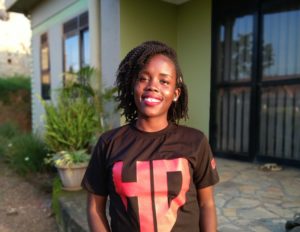 Acan Innocent Immaculate is a Ugandan speculative fiction writer who is also currently in her final year at the Makerere University School of Medicine, pursuing a Bachelor’s degree in Medicine and Surgery. She won the Writivism Short Story Prize in 2016, and has been published in AFREADA, Omenana and Brittle Paper. Her most recent works have appeared on Sooo Many Stories and in Selves: An Afro Anthology of Creative Nonfiction.
Acan Innocent Immaculate is a Ugandan speculative fiction writer who is also currently in her final year at the Makerere University School of Medicine, pursuing a Bachelor’s degree in Medicine and Surgery. She won the Writivism Short Story Prize in 2016, and has been published in AFREADA, Omenana and Brittle Paper. Her most recent works have appeared on Sooo Many Stories and in Selves: An Afro Anthology of Creative Nonfiction.



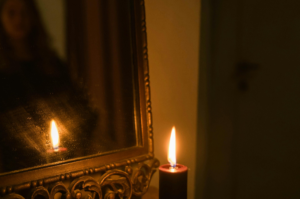
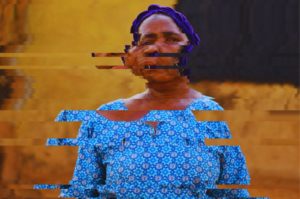


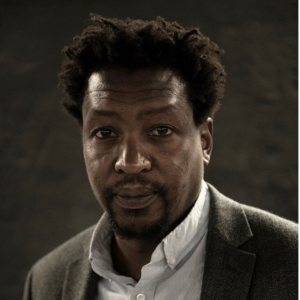

The 2019 Brittle Paper Awards: Announcing The 5 Shortlists November 22, 2019 14:43
[…] “Songbird,” by Innocent Acan Immaculate (Uganda), FICTION, in Go the Way Your Blood Beats: Short Fiction from Africa […]